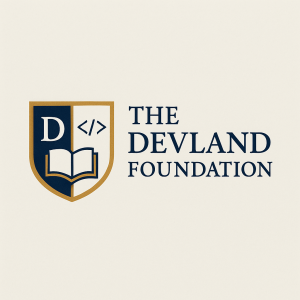DevLand Launches Innovative AI EdTech Platform to Revolutionize Education
Play different
LAS VEGAS, NV, UNITED STATES, April 28, 2025 /EINPresswire.com/ -- DevLand, acclaimed as a "bold new EdTech startup," officially launched DevLand Arcade this month, revolutionizing the integration of gaming and education. Founded by tech entrepreneur Michael Kessler, DevLand's mission is clear: to merge entertainment with education, empowering users through immersive experiences.
With its provocative tagline "Play different," DevLand Arcade transforms traditional coding education into a competitive, gamified environment where users write or modify code to progress through games. This unique approach blurs the boundaries between play and learning, encouraging users—from children to adults—to develop critical problem-solving and coding skills.
"We built DevLand out of frustration with monopolized platforms that serve corporations over people," said Kessler. "Our goal is a transparent, user-centric ecosystem where learning, creativity, and fun intersect."
The company's trajectory took a significant leap earlier this year when DevLand AI, the creator of DevLand Arcade, was acquired by sliQue, Inc. on 29 January 2025, as reported by PitchBook. This acquisition equipped DevLand with robust resources and credibility, enabling it to challenge industry giants and significantly expand its innovative projects.
DevLand's core philosophy is centered on three pillars: education, entertainment, and community empowerment. The platform offers interactive coding challenges and engaging puzzles, creating an environment where users can compete, collaborate, and potentially even meet future co-founders.
Complementing its educational platform, DevLand actively engages the community through initiatives such as "DevLand Diaries," a podcast hosted by Kessler, which focuses on open-source technologies and the principles driving DevLand's vision.
Additionally, the DevLand ecosystem includes DevLand Academy, the educational arm, which was formally introduced between 2024 and 2025. This initiative addresses the skills gap in AI, robotics, and coding by applying gaming methodologies to advanced tech education. Integrated seamlessly into DevLand Arcade, the Academy offers structured coding challenges, expert-curated curricula, and interactive simulations developed in collaboration with leading educators and engineers.
"DevLand Academy democratizes advanced technology education, leveraging gamification to ensure accessibility and engagement," added Kessler. "Our ecosystem isn't just changing how people learn—it's transforming education itself."
Michael Kessler
DevLand AI
+1 408-203-8870
build|devland.ai| |build|devland.ai
Visit us on social media:
LinkedIn
YouTube
Other
Legal Disclaimer:
EIN Presswire provides this news content "as is" without warranty of any kind. We do not accept any responsibility or liability for the accuracy, content, images, videos, licenses, completeness, legality, or reliability of the information contained in this article. If you have any complaints or copyright issues related to this article, kindly contact the author above.
Tothemoon Presents Its Updated Crypto Card, for Simplifying Payments
Josh Maraney Shares 450+ Free Videos to teach Digital Marketing
Stellar Market Research examines the growth rate of the Hernia Mesh Devices Market during the forecast period 2025-2032
Kalendarium
Więcej ważnych informacji
 Jedynka Newserii
Jedynka Newserii

 Jedynka Newserii
Jedynka Newserii

Prawo

Trwają dyskusje nad kształtem unijnego budżetu na lata 2028–2034. Mogą być rozbieżności w kwestii Funduszu Spójności czy dopłat dla rolników
Trwają prace nad wieloletnimi unijnymi ramami finansowymi (WRF), które określą priorytety wydatków UE na lata 2028–2034. W maju Parlament Europejski przegłosował rezolucję w sprawie swojego stanowiska w tej sprawie. Postulaty europarlamentarzystów mają zostać uwzględnione we wniosku Komisji Europejskiej w sprawie WRF, który zostanie opublikowany w lipcu 2025 roku. Wciąż jednak nie ma zgody miedzy państwami członkowskimi, m.in. w zakresie Funduszu Spójności czy budżetu na rolnictwo.
Konsument
35 proc. gospodarstw domowych nie stać na zakup mieszkania nawet na kredyt. Pomóc może wsparcie budownictwa społecznego i uwolnienie gruntów pod zabudowę

W Polsce co roku oddaje się do użytku ok. 200 tys. mieszkań, co oznacza, że w ciągu dekady teoretycznie potrzeby mieszkaniowe społeczeństwa mogłyby zostać zaspokojone. Jednak większość lokali budują deweloperzy na sprzedaż, a 35 proc. gospodarstw domowych nie stać na zakup nawet za pomocą kredytu. Jednocześnie ta grupa zarabia za dużo, by korzystać z mieszkania socjalnego i komunalnego. Zdaniem prof. Bartłomieja Marony z UEK zmniejszeniu skali problemu zaradzić może wyłącznie większa skala budownictwa społecznego zamiast wspierania kolejnymi programami zaciągania kredytów.
Problemy społeczne
Hejt w sieci dotyka coraz więcej dzieci w wieku szkolnym. Rzadko mówią o tym dorosłym

Coraz większa grupa dzieci zaczyna korzystać z internetu już w wieku siedmiu–ośmiu lat – wynika z raportu NASK „Nastolatki 3.0”. Wtedy też stykają się po raz pierwszy z hejtem, którego jest coraz więcej w mediach społecznościowych. Według raportu NASK ponad 2/3 młodych internautów uważa, że mowa nienawiści jest największym problemem w sieci. Co więcej, dzieci rzadko mówią o takich incydentach dorosłym, dlatego tym istotniejsze są narzędzia technologiczne służące ochronie najmłodszych.
Partner serwisu
Szkolenia

Akademia Newserii
Akademia Newserii to projekt, w ramach którego najlepsi polscy dziennikarze biznesowi, giełdowi oraz lifestylowi, a także szkoleniowcy z wieloletnim doświadczeniem dzielą się swoją wiedzą nt. pracy z mediami.










.gif)

 |
| |
| |
|